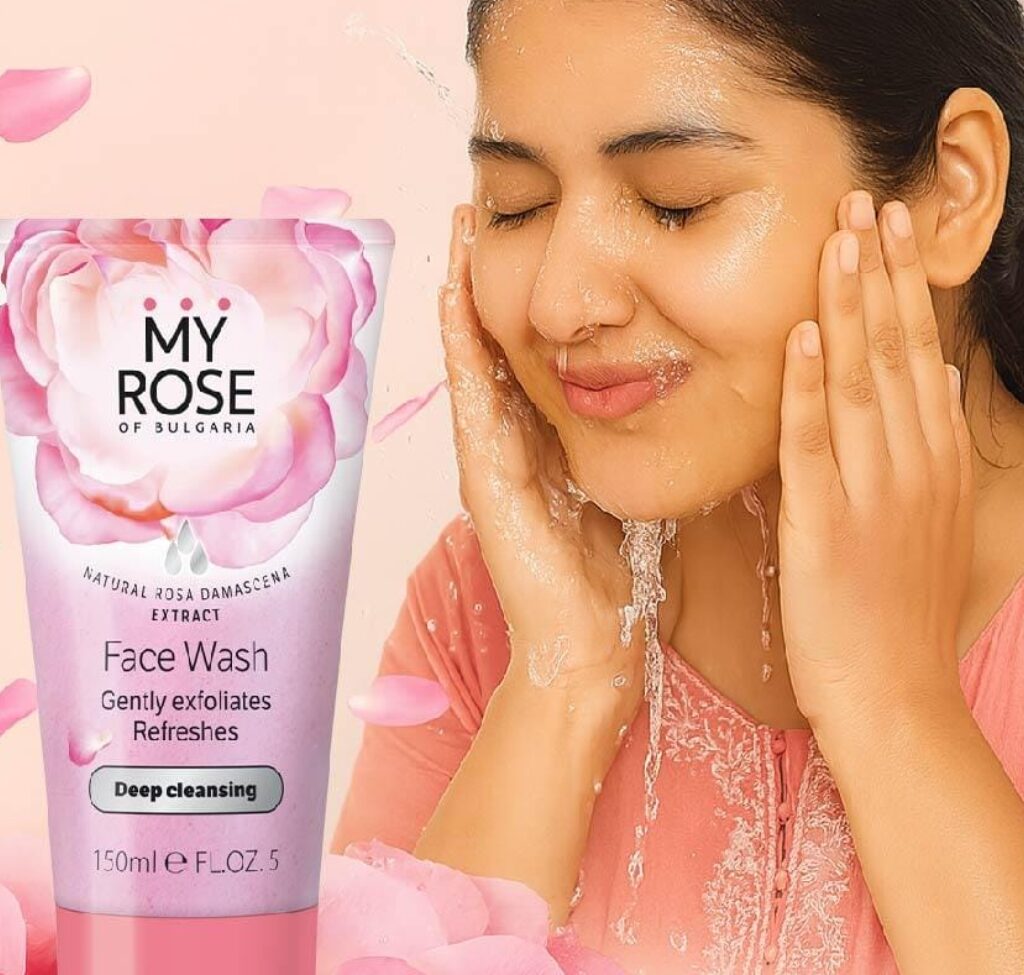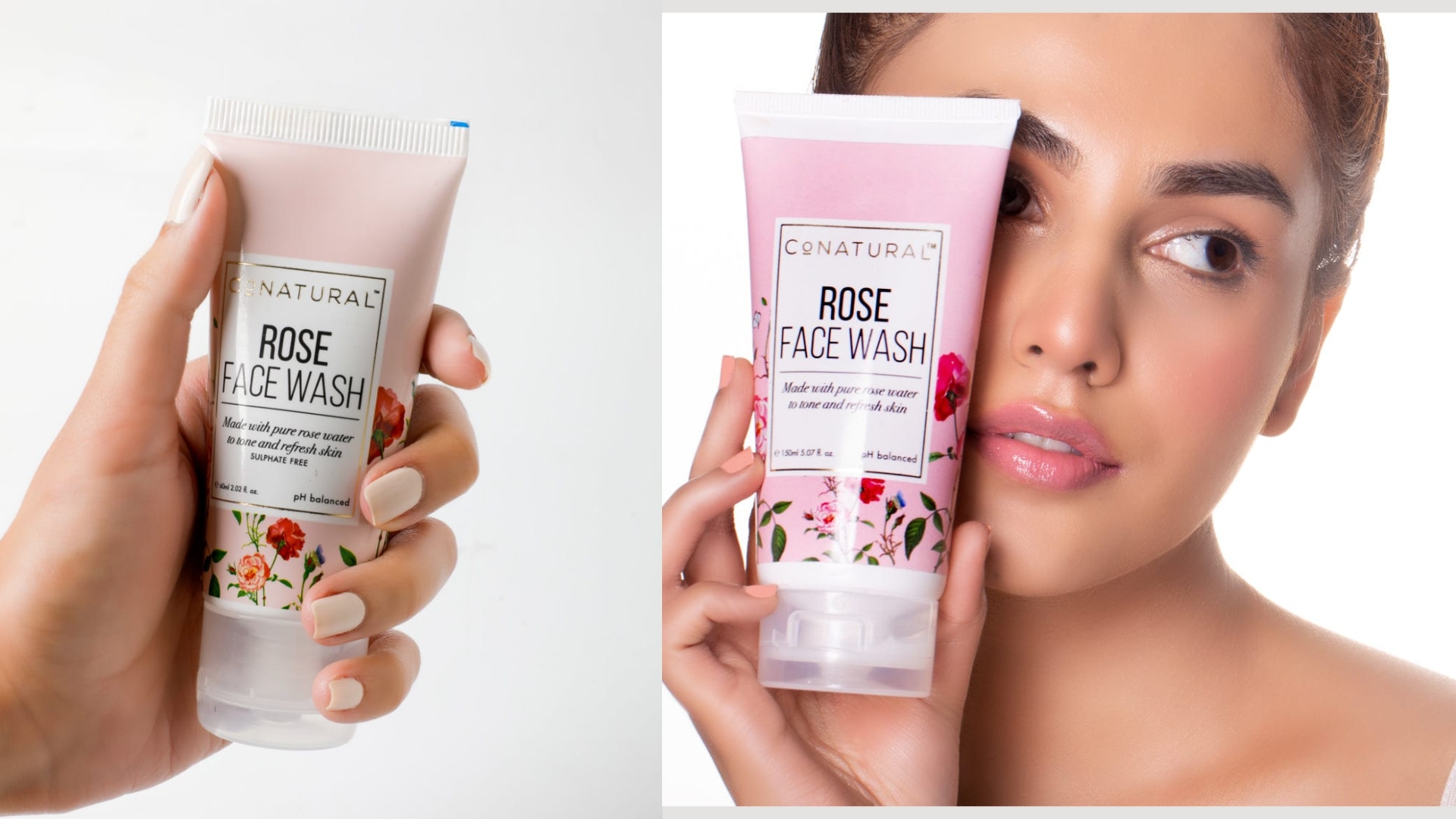Rose face wash brings centuries of beauty wisdom into modern skincare routines. This gentle cleanser transforms your daily ritual into a luxurious experience while delivering real results.
Rose petals contain powerful compounds that nourish, soothe, and protect your skin. Professional dermatologists recommend rose-based products for sensitive skin types. The fragrant flower offers more than just a pleasant scent—it provides genuine therapeutic benefits.
This comprehensive guide explores everything about rose face wash. You’ll discover its proven benefits, learn proper application techniques, and understand key ingredients. We’ll also share expert tips for choosing the right product for your skin type.
What Makes Rose Face Wash Special?
Rose face wash stands out from ordinary cleansers through its unique botanical properties. The formula combines gentle cleansing with intensive skin treatment. Traditional skincare wisdom meets modern formulation science in these products. Real roses contain over 300 chemical compounds. These natural elements work together to create synergistic effects on your skin. Rose water forms the foundation of most rose face washes. Manufacturers extract this precious liquid through steam distillation of fresh rose petals.
These flowers grow in optimal climate conditions that concentrate their beneficial compounds. Premium brands source their rose extracts from these regions to ensure maximum potency. This compatibility reduces irritation risks common with harsh cleansers. Your skin’s protective barrier remains intact while unwanted impurities get removed.

Proven Benefits of Rose Face Wash
Deep Cleansing Without Stripping
Rose face wash removes dirt, oil, and makeup effectively. The gentle formula penetrates pores to eliminate impurities without causing dryness. Clinical studies show rose extracts possess antimicrobial properties. These compounds fight acne-causing bacteria while being gentle on healthy skin cells. Your complexion appears clearer without the tightness associated with aggressive treatments.
Soothes Inflammation and Redness
Rose contains natural anti-inflammatory compounds called anthocyanins. These antioxidants reduce skin irritation and calm reactive conditions. People with rosacea, eczema, or sensitive skin find relief through regular use. Dermatological research demonstrates rose’s ability to reduce inflammatory markers in skin tissue. This scientific backing supports traditional uses of rose in skincare.
Provides Intense Hydration
Rose face wash delivers moisture through multiple mechanisms. Rose water attracts and binds water molecules to your skin surface. Additional ingredients like glycerin and natural oils enhance this hydrating effect. This combination creates a reservoir of moisture that lasts throughout the day. Your skin feels soft and supple after each cleansing session.
Offers Anti-Aging Protection
Rose extracts contain vitamins A and C, essential nutrients for healthy skin aging. Vitamin C stimulates collagen production while providing antioxidant protection. Vitamin A promotes cell turnover for smoother, more radiant skin.
Free radicals cause premature aging through oxidative stress. Rose’s antioxidant compounds neutralize these harmful molecules before they damage your skin cells. Regular use helps maintain a youthful appearance and prevents fine lines.
Balances Oil Production
The natural astringent properties tighten pores while maintaining necessary moisture levels. This balance prevents both excessive oiliness and uncomfortable dryness. People with combination skin benefit particularly from rose’s regulating effects. T-zone areas receive oil control while cheeks get nourishing hydration.
Key Ingredients to Look For
Pure Rose Water
Authentic rose water should appear as the first or second ingredient. Avoid products listing “rose fragrance” instead of actual rose water or extracts. Steam-distilled rose water retains maximum therapeutic properties. Some manufacturers use solvent extraction methods that reduce potency. Check product labels for distillation methods when available.
Rose Essential Oil
Genuine rose essential oil costs significantly more than synthetic alternatives. A few drops provide therapeutic benefits without overwhelming the formula. This ingredient should appear in small concentrations due to its potency. Rosa Damascena and Rosa Centifolia represent the most beneficial rose species. These varieties contain higher levels of therapeutic compounds compared to decorative roses. Premium brands specify the exact rose species used.
Complementary Botanical Ingredients
This gentle herb reduces sensitivity while providing additional anti-inflammatory benefits. The combination creates a powerful yet gentle cleansing experience. Aloe vera adds extra hydration and healing properties. Its gel-like texture also improves the product’s application feel. This humectant prevents the drying effects sometimes associated with cleansing products. Natural glycerin derived from plants offers better skin compatibility.
Gentle Cleansing Agents
Coconut-derived surfactants provide effective cleansing without harsh sulfates. Sodium cocoyl glutamate and similar ingredients create rich lather while maintaining skin-friendly pH levels. These alternatives reduce irritation risks significantly. Avoid products containing sodium lauryl sulfate (SLS) or similar harsh detergents. These chemicals strip your skin’s protective oils and can cause long-term barrier damage. Gentle alternatives clean just as effectively without negative side effects.
How to Use Rose Face Wash Properly
Morning Routine Application
Start with lukewarm water to open pores gently. Hot water can irritate sensitive skin and cause excessive dryness. Cold water fails to soften debris for effective removal. Apply a coin-sized amount of rose face wash to your palms. The foam should feel luxurious, not harsh or stripping.
Focus on areas prone to oil buildup, like your T-zone. Avoid the delicate eye area where specialized removers work better. Spend 30-60 seconds massaging to ensure thorough cleansing. This duration allows active ingredients to penetrate while promoting blood circulation. Gentle pressure prevents irritation while maximizing benefits.
Evening Deep Cleanse
Remove makeup first with a dedicated makeup remover or cleansing oil. This pre-step prevents makeup from interfering with your rose face wash’s effectiveness. Double cleansing ensures complete impurity removal.
Follow the same application technique as your morning routine. Evening cleansing can include slightly longer massage time to address the day’s accumulated pollutants and sweat. Pay extra attention to hairline areas where product residue often accumulates. These forgotten zones can develop clogged pores if not properly addressed during cleansing.
Post-Cleansing Care
Take time to ensure complete removal. Avoid rubbing motions that can irritate freshly cleansed skin. Apply your regular skincare products immediately after cleansing. Freshly cleansed skin absorbs serums and moisturizers more effectively. This timing maximizes your entire routine’s benefits.
Choosing the Right Rose Face Wash
For Dry Skin Types
Look for cream-based rose cleansers with added oils. Avocado oil, sweet almond oil, and squalane provide extra nourishment. These ingredients prevent the tightness often experienced by people with dry skin.
Avoid foaming formulas that can strip essential oils. Cream cleansers maintain moisture while effectively removing impurities. The texture should feel comfortable throughout application. These compounds work with rose extracts to create a moisture-rich cleansing experience.
For Oily Skin Types
Gel-based rose face washes provide better oil control without over-drying. These formulas balance cleansing power with rose’s soothing properties. The texture feels refreshing without leaving residue.
Willow bark extract (natural salicylic acid) complements rose in oil-control formulas. This combination addresses excess sebum while preventing irritation common with synthetic acids.
Look for non-comedogenic formulations that won’t clog pores. This certification ensures the product supports clear skin rather than contributing to breakouts.
For Sensitive Skin Types
Choose products with minimal ingredient lists to reduce reaction risks. Rose water, glycerin, and gentle cleansing agents should dominate the formula. Avoid products with fragrances beyond natural rose scent. This precaution prevents widespread irritation. pH-balanced formulas work best for sensitive skin types. Products with pH levels between 5.0-6.0 support your skin’s natural protective function.
Common Mistakes to Avoid
Over-Cleansing Your Skin
Even gentle formulas can cause problems when overused. Stick to morning and evening applications for optimal results. Extended massage times don’t improve cleansing effectiveness. Excessive rubbing can irritate skin and damage the protective barrier. Follow recommended application times consistently.
Using the Wrong Water Temperature
Extremely hot water strips natural oils and causes inflammation. Very cold water prevents effective product activation and pore opening. Temperature shock from alternating hot and cold water can cause broken capillaries. Maintain consistent, comfortable water temperature throughout your cleansing routine.
Ignoring Product Expiration
Rose-based products contain natural ingredients that degrade over time. Expired products lose effectiveness and may harbor harmful bacteria. Heat and light accelerate ingredient breakdown in natural formulas. Proper storage extends product life and maintains potency.
Professional Recommendations
Leading dermatologists recognize rose’s therapeutic potential in skincare. Dr. Jennifer Herrmann, a board-certified dermatologist, notes rose water’s ability to maintain skin pH while providing gentle cleansing. The American Academy of Dermatology acknowledges natural ingredients like rose as beneficial for sensitive skin care. Their guidelines emphasize gentle formulations for maintaining healthy skin barriers.
Clinical research from the International Journal of Cosmetic Science demonstrates rose extract’s anti-inflammatory effects. These peer-reviewed studies provide scientific backing for traditional rose uses in skincare. European dermatological associations have documented rose’s effectiveness in treating various skin conditions. Countries with long rose cultivation traditions show extensive research into cosmetic applications.
Environmental and Ethical Considerations
Sustainable rose farming practices protect both the environment and product quality. Look for brands supporting organic cultivation and fair trade relationships with rose growers. These practices ensure ingredient purity while supporting farming communities. Water usage in rose cultivation requires careful management. Responsible brands invest in efficient irrigation systems and water conservation technologies. These efforts reduce environmental impact while maintaining rose quality.
Packaging choices reflect brand commitment to sustainability. Glass containers and recyclable materials demonstrate environmental responsibility. Some brands offer refill programs to reduce packaging waste further. Animal testing remains unnecessary for rose-based skincare products. Cruelty-free certifications ensure ethical product development. Many effective rose face washes carry Leaping Bunny or similar certifications.
The Science Behind Rose’s Effectiveness
Rose petals contain over 400 chemical compounds contributing to their therapeutic properties. Geraniol, citronellol, and nerol provide antimicrobial benefits while creating the characteristic rose fragrance. Phenolic compounds in roses offer potent antioxidant activity. These molecules neutralize free radicals that cause cellular damage and premature aging. Laboratory studies demonstrate significant protective effects against oxidative stress.
Rose’s anti-inflammatory mechanisms work through multiple pathways. The flower’s compounds inhibit inflammatory mediators while promoting healing responses. This dual action explains rose’s effectiveness across various skin conditions. Moisture retention studies show rose water’s ability to improve skin hydration. The water-binding properties help maintain optimal moisture levels throughout the day.
Making Rose Face Wash Part of Your Routine
Integration with existing skincare products requires thoughtful planning. Rose face wash works well with most serums, moisturizers, and treatments. Avoid combining with harsh acids or retinoids immediately after cleansing. Seasonal adjustments may benefit your skin’s changing needs. Summer routines might emphasize rose’s cooling and oil-balancing properties. Winter use can focus on hydrating and soothing benefits.
Travel considerations include product size restrictions and climate changes. Smaller sizes allow routine maintenance while traveling. Consider how different climates might affect your skin’s response to rose face wash. Long-term use typically shows cumulative benefits over several weeks. Significant changes in skin tone and clarity develop over months of consistent use.
Conclusion
Rose face wash represents skincare evolution—honoring traditional wisdom while embracing scientific advancement. Your daily cleansing ritual transforms into a therapeutic experience that nourishes both skin and senses. The journey toward healthier skin begins with understanding your unique needs. Rose face wash offers gentle effectiveness suitable for various skin types and concerns. This versatility makes it an excellent foundation for any skincare routine.
Modern life exposes skin to countless stressors from pollution to digital screens. Rose’s protective and restorative properties provide a natural defense system. Each cleansing session becomes an act of self-care that honors your skin’s inherent wisdom. Consider rose face wash as an investment in long-term skin health. Your skin deserves ingredients that work in harmony with its natural functions.
The future of skincare lies in this perfect balance between nature and science. Rose face wash exemplifies how traditional ingredients can meet contemporary standards for safety and effectiveness. Your skin receives the best of both worlds through this thoughtful combination.
Start your rose face wash journey with realistic expectations and consistent application. Allow time for your skin to adjust and respond to new ingredients. The gradual transformation will reward your patience with healthier, more radiant skin that reflects inner vitality.


fjxgat
y8pf42